More than 20 countries were represented at the European Evangelical Alliance General Assembly 2016. The “identity of Europe” and the Christian response to several challenges was discussed in Colares (Portugal).
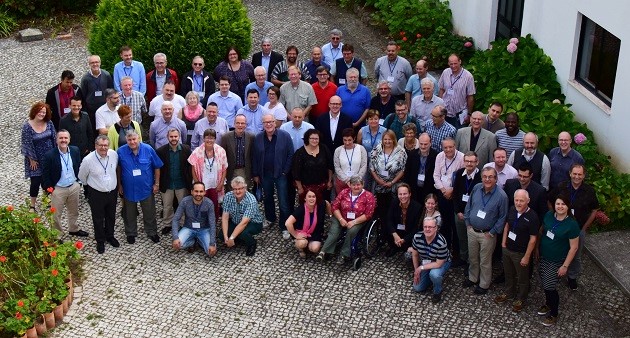 The participants of the 2016 EEA General Assembly.
The participants of the 2016 EEA General Assembly.
The General Assembly of the European Evangelical Alliance (EEA) in Colares (Portugal, 10-13 October) accepted the Russian Evangelical Alliance (REA) as a full member of the European evangelical body.
The Russian delegation at the EEA annual meeting was represented by the Secretary General of the REA, Sergey Vdovin, and President Alexander Fedichkin.
EEA: MEMBERSHIP OF RUSSIA WILL “HELP BUILD BRIDGES”
“There is a significant number of Evangelicals in Russia”, EEA Secretary General Thomas Bucher said, and “Eastern Europe needs to have a voice in the EEA, it will be strengthened considerably through this”.
“The political tensions between Russia and many other European states are well known”, Bucher added. “Therefore this move will build bridges and is hopefully a contribution for peace and reconciliation. This is especially important for the relations between Russia and the Ukraine.”
In fact, “it is hoped that within the next twelve months the Ukrainian Evangelicals will form a representative body which will also join the EEA”, the Secretary General said.
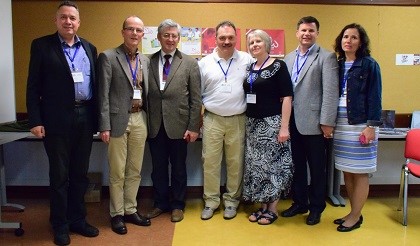 EEA President and Secretary General with the Russian delegation at the 2016 EEA General Assembly. / Herman Spaargaren
EEA President and Secretary General with the Russian delegation at the 2016 EEA General Assembly. / Herman Spaargaren“WE STRONGLY FAVOUR PEACE AND RECONCILIATION”
The Evangelical Alliance in Russia was relaunched in April 2003 by 145 delegates from Russia’s largest Protestant denominations and organisations.
In 2007, the Russians applied for EEA membership. After nine years, all sides have now agreed to membership status.
One of the Russians attending this year’s EEA General Assembly in Colares was Vitaly Vlasenko, Director of External Relations for the Moscow-based Russian Union of Evangelical Christians-Baptists. Vlasenko told the REA: “I believe this a very significant and positive development for the Russian Alliance. Early in the 18th century, Tsar Peter the Great had reached out the hand of friendship to the countries of Western Europe. We understand ourselves very much in that tradition. We strongly favour peace and cooperation, and we from the Russian Alliance stand for the close collaboration of evangelical churches throughout Europe”.
GOOD NEWS PEOPLE IN A TIME OF CHANGE
Throughout the four days of the EEA General Assembly, the 70 participants coming from more than 20 European countries shared their views on how the church can make a difference in a key moment of the history of the continent.
The whole programme revolved around the topic: “Being good news people in a time of change, shaping the identity of our nations and continent”.
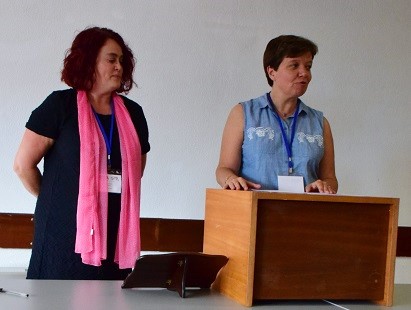 Staff members Hester Zoutman and Julia Doxat-Purser sharing about their work in the last year. / Herman Spaargaren
Staff members Hester Zoutman and Julia Doxat-Purser sharing about their work in the last year. / Herman SpaargarenEEA staff members reported about their work in the last months in areas like: the socio-political sphere (the EEA has an office in the heart of the EU, Brussels), religious freedom, the fight against human trafficking (see European Freedom Network), the work to connect churches to serve refugees (the Refugee Campaign has been propelled) and initiatives in the area of children and youth ministry.
Other participants also spoke of initiatives happening in their context and shared their resources in a ministries “market”. Inspiring stories and good practices were commented in small discussion groups on special interests: politics, media, children, refugees, human trafficking, etc.
BIBLE STUDY: OLD WINE, NEW WINE
The national director of the Evangelical Alliance Scottland, Fred Hammond, was in charge of the Bible expositions, he spoke about the need of the churches to “re-align” to the identity that can be found in Acts 2. Christian communities, he said, should be marked by “radical word, radical prayer, radical sacrifice, radical gratitude, radical leadership and radical growth”. In this process, he said, God’s role is always central.
Most churches in Europe are experiencing a “threshold moment”, Hammond said. “We have to keep the Acts DNA with new structures.” Commenting on Luke 5:33, he spoke about the risk “thinking the old wine was always better”.
Looking at Psalm 137, Hammond reflected about what does it mean to stay faithful in a secularised context in which the structures of the church have been pushed to the margins of society.
“What does it mean to be a blessing for others and live in forgiveness over and over again?” Making disciples who follow Jesus should be the main focus for every Christian community, he concluded.
WHAT DOES “EUROPE” MEAN?
In two sessions, the professor of religious studies and missiology at the Evangelical Theological Faculty in Leuven (Belgium) Evert Van de Poll stressed the need to understand that people across the continent have very different views of what “Europe” means.
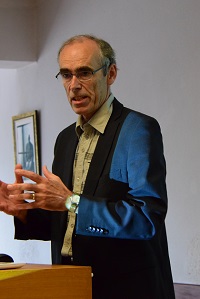 Evert Van de Poll during his lecture. / Herman Spaargaren
Evert Van de Poll during his lecture. / Herman SpaargarenEurope can be seen as a cultural zone with common values (human rights, tolerance, freedom of conscience…), as a political or economic union (the EU), as a mere geographic space with its history, etc. Who is “in” and “out” in these definitions of Europe? Who is a friend and who is seen as an enemy?
The professor spoke on how the Christian heritage has helped create the grounds of European societies. But, while some try to emphasise these Christian roots, a strong agenda downplays the influence of faith in the making of Europe.
CULTURAL INFLUENCE IN A WORLD IN NEED
Artist and theologian Leen La Rivière (Continental Ministries Europe, Netherlands) spoke about the “pillars of society” in his lecture. Strong spheres like politics, economy and family/religion fight against each other, he said.
La Rivière talked about how Christians abandoned the places of cultural influence in the past. Now, “as long as we have a ‘secular vs. spiritual’ thinking, we will have no impact in culture. We have to find our space and put the right Christians in all these areas”, he said.
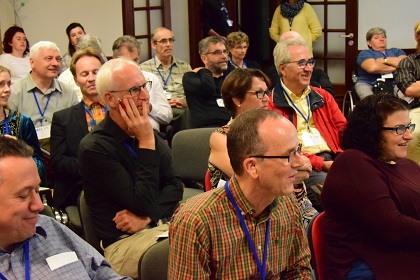 Some of the attendants in a session. / Herman Spaargaren
Some of the attendants in a session. / Herman SpaargarenMatt Bird, founder of the Cinnamon Network (UK), gave some practical examples of how Christians can build relationships with other sectors of society and have a positive influence, especially in a city level. “We do not have automatically credibility, we have a record and baggage as a church”, he admitted.
Christian communities seeking to serve their context should be “faith-based but not faith-biased”. In a moment of strong secularism, Christians have to “deprivatise our faith” and unashamedly serve others and “demonstrate in our actions that the Jesus manifesto is authentic and real”, he said.
THE RISE OF POPULISM
The Brussels representative of the EEA, Christel Lamère Ngnambi (Belgium), spoke on how “national populism has been on the rise almost everywhere in Europe for the last 15 years”. The refugee crisis has become a “spiritual revealer”. Some ideological movements are using a religious language to portray the state as a kind of “saviour god” against supposed enemies.
In the new context, Christians can be fearful – some are concerned about Islam and its impact in their society, and are hurt when they are labelled as “racists”- but also, at times, too naïve about the effects of migration, Lamère analysed. In the midst of a very complex and sensitive situation, “it is high time to make Christian sense of this moment”, Lamère said.
After this session, representatives from Denmark, Czech Republic, France, Germany and the Netherlands shared how churches are responding to the populistic messages.
REFUGEES AND THE ROLE OF CHRISTIANS
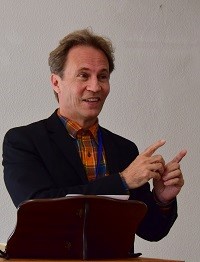 Timo Keskitalo spoke on refugees and the response of churches. / Herman Spaargaren
Timo Keskitalo spoke on refugees and the response of churches. / Herman SpaargarenThe issue of the refugee crisis and how churches are responding to it was throughout the whole EEA meeting. Reverend Timo Keskitalo presented the refugee crisis as an opportunity for a church in a context in which Islam will have a growing influence. Big number of refugees are getting baptised and help the growth of Christian churches, but Muslims communities have a stronger voice. Europe will see how “history, faith and politics get mixed” more and more.
Keskitalo called church to show how the gospel contrasts with Islam: “The real spiritual challenge for us is the concept of sacrificial love and martyrdom as testimony”.
‘THE HOPE’ AWARD GOES TO GREECE
On the last evening of the EEA General Assembly, the 2016 Hope award was given to the Greek Evangelical Alliance to underline their work with refugees.
Portuguese church leaders and political representatives participated in the special public event in the nearby city of Sintra. Read a full report about the Hope award 2016 here.

Las opiniones vertidas por nuestros colaboradores se realizan a nivel personal, pudiendo coincidir o no con la postura de la dirección de Protestante Digital.
Si quieres comentar o